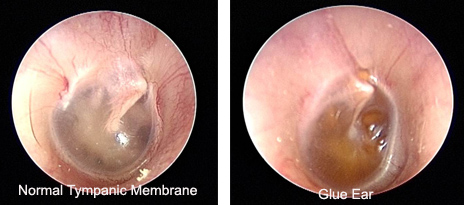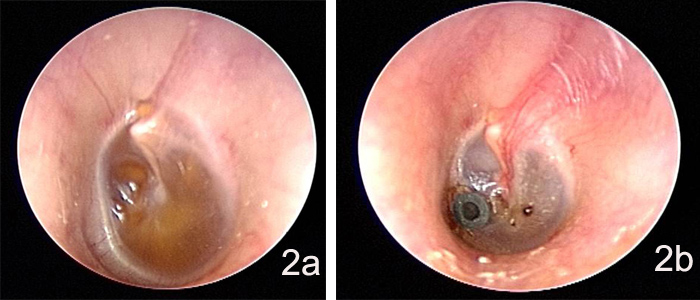Home / Ear Disease & Hearing Loss / Glue Ear
Glue Ear
Call +65 8125 3580
for 24 by 7 appointment
What is a “Glue Ear”?
Glue ear is a condition in which the middle ear becomes filled with fluid. Though common is children, it may occur in adults as well. The medical term for glue ear is otitis media with effusion (OME).

The main symptom of glue ear is some hearing loss in one or both ears.
What causes glue ear?
The middle ear is the part of the ear directly behind the eardrum. It is made up of three tiny bones that carry sound vibrations from the eardrum to the inner ear. The build-up of fluid associated with glue ear prevents these bones moving freely, which affects hearing because it means they can’t pass sound vibrations to the inner ear. As seen on the endoscopic view of the ear drum above the normal ear drum has a translucent shiny appearance. When there is fluid in the middle ear, the ear drum becomes retracted and becomes straw colored.
Exactly what causes this build-up of fluid is unclear, although it seems to be related to a problem with the tube that connects the middle ear to the back of the throat (Eustachian tube). One of the main functions of this tube is to help drain fluid from the middle ear.
It’s thought that problems with the Eustachian tube may be caused by things like a previous ear infection, smoke irritation or allergies. Glue ear is not caused by getting water in the ear after swimming and showering or by a build-up of ear wax.
In adults, a glue ear particularly if it unilateral (only affects one ear), may be due to a growth in the nasopharynx obstructing or effacing the Eustachian tube. A unilateral glue ear, particularly among the Chinese may be due nose cancer (Nasopharyngeal Carcinoma). Other causes of middle ear include a dysfunctional Eustachian tube or barotrauma.
Treatment of Glue Ear
Most cases of glue ear don’t require any active treatment as the condition resolves spontaneously with 2-3 months.
Treatment is normally only recommended when symptoms last longer than 2 -3 months and the hearing loss is thought to be significant enough to interfere with a child’s speech and language development.
In these circumstances, glue ear can usually be treated using minor surgery, which involves placing small tubes (grommets) in the ear to help drain away the fluid. (See below).

Not sure if you are experiencing glue ear? Speak to A/Prof Sethi to find out if this is the medical condition you are having at +65 8125 3580. Or book an appointment with A/Prof Sethi for a consultation on your symptoms and treatment options.
